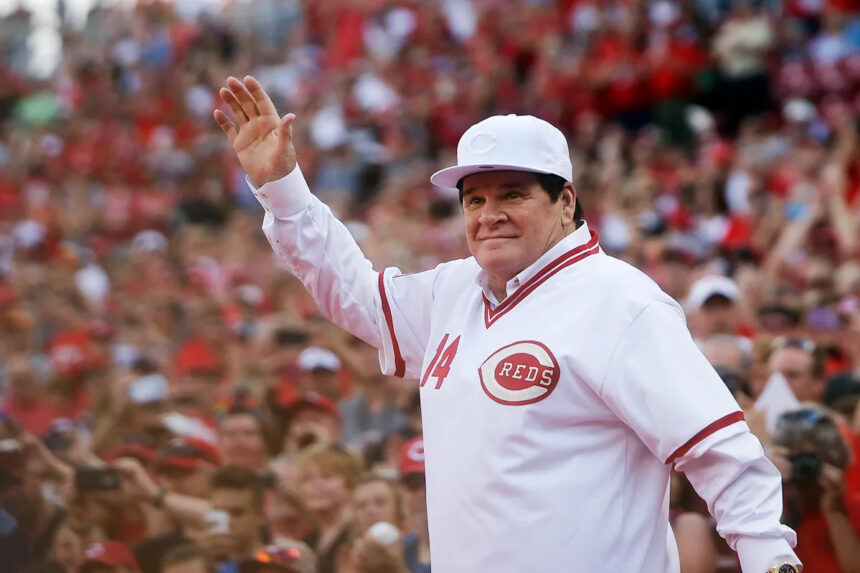In an unexpected development, Major League Baseball (MLB) announced on Tuesday that the concept of integrity can shift over time, akin to the constant ebb and flow of the tides.
This landmark decision, revealed by Commissioner Rob Manfred, officially removes Pete Rose, along with the notorious “Shoeless” Joe Jackson and 15 other deceased figures, from MLB’s permanently ineligible list. This monumental ruling opens the door for Rose—banned in 1989 for betting on baseball—to potentially enter the Hall of Fame for the first time.
Advertisement
“From my perspective, the goals of Rule 21 are realized once an individual has passed,” Manfred remarked. “A deceased person can no longer jeopardize the game’s integrity, and it’s hard to envision a penalty more severe than a lifetime ban without the possibility for redemption.”
This ruling, while applying to all 16 deceased players (along with one former owner) listed as ineligible, brings particular attention to Rose and the possible prospects for his enshrinement in Cooperstown.
Reflecting on Rose’s exit from baseball in November 1986, many believed his eventual induction into the Hall was merely a matter of time. His staggering achievements—4,256 hits, 3,562 games played, and 15,890 plate appearances—place him on an exalted pedestal in baseball history. Over an illustrious 24-season career, Rose tallied 17 All-Star selections, earned three batting titles, was crowned MVP of the National League in 1973, and celebrated three World Series championships. His relentless hustle earned him the nickname “Charlie Hustle,” solidifying his legacy with fans.
While there’s little dispute about his athletic prowess, which undoubtedly warrants consideration for the Hall, the narrative is more complicated.
Back in March 1989, allegations emerged that Rose was involved in gambling while he served as player-manager for the Cincinnati Reds. This scandal dominated headlines during a tumultuous transition in MLB leadership from Peter Ueberroth to A. Bartlett Giamatti. Following an exhaustive investigation culminating in the Dowd Report, Giamatti delivered the life-altering ruling that banned Rose from baseball, citing the tarnishing of the game’s reputation.
“The life ban imposed on Pete Rose signifies the sad end to a regrettable chapter in baseball,” Giamatti solemnly conveyed to a throng of reporters at the Hilton Hotel in New York City. “One of the sport’s greatest players has taken actions that have sullied it, and he must now face the implications.”
Unfortunately, Rose left this world still entangled in those same consequences.
Advertisement
On September 30, 2024, the baseball legend passed away at 83. For the 35 years following his banishment, the fiercely passionate Rose did not embark on a journey of apology or contrition. Instead, despite his vow to never gamble on sports again, he led a life marked by denial—punctuated by a prison sentence for tax evasion in 1990 and later allegations of statutory rape surfacing in 2017.
Even in the face of Giamatti’s assertion that “the responsibility to exhibit a changed life belongs solely to Pete Rose,” the league had left a potential avenue open for reinstatement. Yet, Rose’s persistent stubbornness kept that door firmly shut.
In 2015, Manfred reaffirmed this stance when he denied yet another request for Rose’s reinstatement.
“In summary, Mr. Rose has not provided credible evidence of a transformed life, whether through a sincere acknowledgment of past mistakes, as documented in the Dowd Report, or by laying out a stringent plan to avoid the behaviors that led to his ineligibility,” Manfred explained.
Advertisement
Despite Rose’s impassioned appeals for reconsideration, Manfred deemed him unfit for another chance.
So, what has changed?
Rose’s passing played a significant role in this shift. For years, Manfred had brushed aside Rose’s numerous attempts at reinstatement. The reality that Rose never experienced the joy of being inducted into the Hall during his lifetime likely weighed heavily on Manfred’s conscience. However, the unfolding events are intertwined with more than Rose’s death.
Advertisement
On February 28, former President Donald Trump took to social media to express his admiration for Rose and vowed to “sign a complete PARDON” for the controversial player. Trump’s long-standing support for Rose dates back to his initial presidential campaign in 2016, when he called for the baseball icon’s induction into the Hall of Fame. This sentiment resurfaced during the 2020 election, potentially as a means to capture voters in Ohio, a pivotal state.
Shortly after Trump reignited this conversation, he welcomed Manfred to the White House.
“We discussed a variety of subjects, including Pete Rose, but I won’t share further specifics,” Manfred said after the meeting. “Trump has made his opinions clear, and I won’t elaborate beyond that.”
Yet, the implications remain evident. Just weeks later, the former president’s insistence has borne fruit.
Advertisement
It’s important to understand that MLB’s willingness to align with Trump regarding Rose transcends mere political strategy. The commissioner’s office appears to have genuine concerns about the administration’s influence over (1) the league’s antitrust exemption and (2) the numerous work visas granted annually to Venezuelan and Cuban players. While no blatant quid pro quo seems to exist, Trump’s hardline immigration policies likely played a role in MLB’s cautious navigation through the current political landscape.
Ultimately, whether or not Rose gains induction into the Hall of Fame is of little consequence to Manfred. This issue has shifted from his oversight into the realm of politics. Moreover, Rose’s removal from the ineligible list does not guarantee his induction; he won’t be eligible for a vote until December 2027, when the Hall’s Classic Baseball Era Committee—comprising 16 esteemed figures from baseball—will evaluate his candidacy. Should 12 of the 16 members vote in favor, he will join the ranks of Cooperstown’s Class of 2028.
Looking ahead, the fate of Rose is now in the hands of the game itself. Not in the hands of Manfred, nor Trump, nor variable public sentiment. It feels like a fitting climax to a saga that has unfolded over decades. If Bart Giamatti’s wise words continue to resonate, those in decision-making roles may not readily embrace Rose.
“I hold baseball as a beautiful and thrilling game, cherished by millions—myself included—and I view it as an important, enduring institution in America,” Giamatti reflected upon announcing Rose’s ban. “It must uphold and strive for the highest standards—integrity, professionalism, performance, and fair play within its own rules.”





















